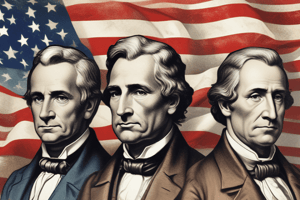Podcast
Questions and Answers
What is the content organization of the AP U.S. Government and Politics course?
What is the content organization of the AP U.S. Government and Politics course?
- Units with suggested pacing
- Class Periods with AP Exam Weighting
- Types of Democracy
- All of the above (correct)
The first unit of the course focuses on ______ and Individual Rights.
The first unit of the course focuses on ______ and Individual Rights.
Democracy
How many class periods are approximately allocated for the unit on Democracy?
How many class periods are approximately allocated for the unit on Democracy?
16
The course facilitates pacing options for both a full year and a single semester.
The course facilitates pacing options for both a full year and a single semester.
What aspect of the course does section 1.6 cover?
What aspect of the course does section 1.6 cover?
Flashcards are hidden until you start studying
Study Notes
Overview of AP U.S. Government and Politics Curriculum
- The curriculum comprises two main units: Foundations of American Democracy and Interactions Among Branches of Government.
- Unit 1 covers ideals, types, and challenges of democracy, government power, and individual rights.
- Unit 1 has a suggested class period allocation of approximately 15-22% and an AP exam weighting of the same range.
- Unit 2 focuses on congressional structures, powers, functions, presidential authority, and checks on the presidency, with a class period allocation of approximately 25-36%.
Unit 1: Foundations of American Democracy
- Explores the core principles of democracy and outlines various types including direct and representative democracy.
- Discusses the concept of government power and the balance with individual rights, emphasizing the challenges faced by the Articles of Confederation.
- Includes the ratification of the U.S. Constitution as a pivotal moment in American history.
- Examines the essential principles underlying American government, including federalism and separation of powers.
Unit 2: Interactions Among Branches of Government
- Covers the role of Congress, detailing functions of both the Senate and the House of Representatives, including legislative processes.
- Addresses congressional behavior and the relationship between legislative actions and public sentiment.
- Discusses the presidency's roles and powers, including the expansion of presidential power and the use of communication in governance.
- Incorporates the judicial branch, focusing on its checks on the presidency and interpretation of laws within the framework of the Constitution.
Pacing and Skills Development
- The course provides pacing options for teaching over a full year or a single semester, allowing flexibility based on educational needs.
- The progression of topics within each unit ensures a spiraling skill development approach, enhancing students' understanding as they advance through the curriculum.
Studying That Suits You
Use AI to generate personalized quizzes and flashcards to suit your learning preferences.




